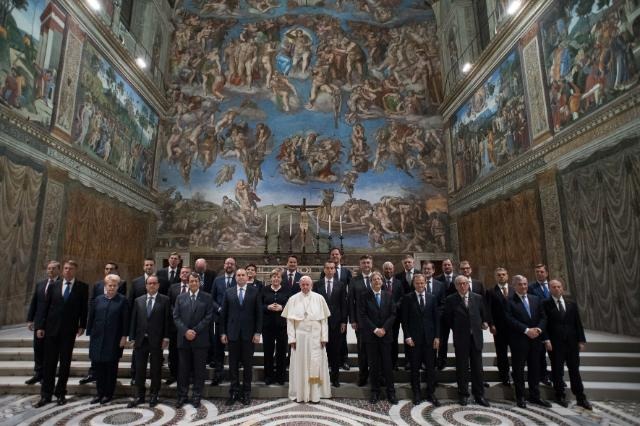60 years after the historic Treaty of Rome which founded the European Economic Community - which later would develop into the European Union - the leaders of the EU Member States and EU institutions met again in Rome on 25 March and signed a new declaration. The only absent country was United Kingdom which has opted for leaving EU. The Rome Declaration takes, rightly so, pride in the achievements of the EU, of which the most important one was ushering a period of peace after the tragedy of two world wars on European soil. The first world war led to the rise of Nazism in Germany that started the second world war and made the Holocaust possible in occupied countries with no rule of the law.
“European unity started as the dream of a few, it became the hope of the many. Then Europe became one again. Today, we are united and stronger: hundreds of millions of people across Europe benefit from living in an enlarged Union that has overcome the old divides.”
That said, the statement does not ignore the problems facing EU today.
“The European Union is facing unprecedented challenges, both global and domestic: regional conflicts, terrorism, growing migratory pressures, protectionism and social and economic inequalities. Together, we are determined to address the challenges of a rapidly changing world and to offer to our citizens both security and new opportunities.”
The statement promises to make the European Union stronger and more resilient, “through even greater unity and solidarity amongst us and the respect of common rules.”
“Unity is both a necessity and our free choice. Taken individually, we would be side-lined by global dynamics. Standing together is our best chance to influence them, and to defend our common interests and values. We will act together, at different paces and intensity where necessary.”
“In the ten years to come we want a Union that is safe and secure, prosperous, competitive, sustainable and socially responsible, and with the will and capacity of playing a key role in the world and of shaping globalization.“
“We want a Union where citizens have new opportunities for cultural and social development and economic growth. We want a Union which remains open to those European countries that respect our values and are committed to promoting them.”
In the statement, EU and its member states pledge to work together towards a safe and secure Europe, including a sustainable migration policy that respects international norms and a determined fight against terrorism. They also pledge to work for a prosperous Europe which creates economic growth and jobs, with secure energy and a clean environment.
The statement also speaks about a social Europe taking into account the diversity of national systems and the key role of social partners (employers and trade organisations). It also aims at a stronger Europe on the global scene, further developing existing partnerships and building new ones to promote stability and prosperity in EU’s neighbourhood and globally.
“We want the Union to be big on big issues and small on small ones. We will promote a democratic, effective and transparent decision-making process and better delivery,” concludes the statement.
EU no doubt needs to reform itself to face the many challenges ahead and to convince citizens to trust its institutions. This process of self-evaluation and reform has in fact already started.
The European Commission issued recently a White Paper on five scenarios for how the EU could evolve by 2025 depending on how it chooses to respond to the current challenges and opportunities.
But more than ever, the EU project is threatened by nationalist forces in the Member States. The extreme anti-EU party in The Netherlands did not emerge as the biggest party in the Dutch elections on 15 March and will not become part of the government but only after some of its populist rhetoric was adopted by the mainstream parties.
The danger for EU is not over yet, with presidential elections in France scheduled for 23 April, with a probable second round with the two top candidates on 7 May. Yann-Sven Rittelmeyer, Policy Analyst at the European Policy Centre (EPC) in Brussels, commented recently on what could happen if the far-right leader of the National Front Marine Le Pen would win in the second round.
“This could lead to a massive default on France's sovereign debt due to Le Pen's promise to reintroduce a national currency. Member states are worried by this scenario but also by the high degree of unpredictability regarding France's future European and foreign policies.” France's attitude towards migrants will certainly also differ according to who is elected president.
“In the short term, a National Front win would throw the European Union into a deep crisis,” wrote politics professor Matthew J. Goodwin in The New York Times (24 March). “A victory for Le Pen, coming after Brexit, would underscore that Europeans have now arrived at a third phase: active rebellion.” He was referring to the previous phases of acceptance of EU followed by skepticism.
Those who continue to defend Brexit as a good thing for United Kingdom, like Allan Johnson in another article in The New York Times (29 March), will probably not feel sorry if the political crisis in EU will worsen. Defining himself a “Lexiteer”, a left-wing supporter of Brexit, he ignores the anti-migration prejudices and fake news that fueled the Leave vote.
For him EU is an “authoritarian project of neoliberal integration” and a “breeding ground” for the far right. He thinks that Brexit was about “taking back control” and that there is a need to restore power to the nation states. As a Eurosceptic he blames the failures in the Member States on EU although every Member State elects its own government and decides on its own social policy and tax policy.
M. Apelblat
The Brussels Times

